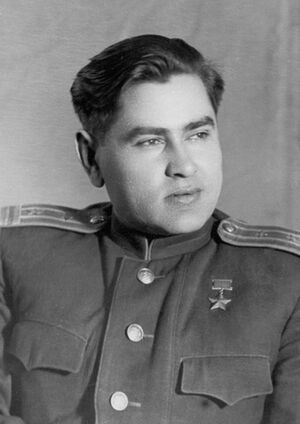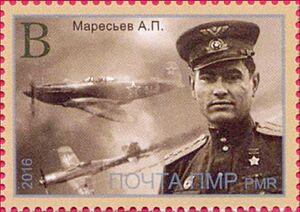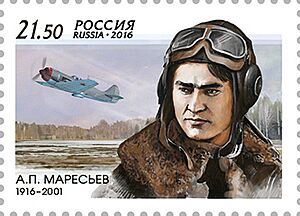Aleksey Maresyev facts for kids
Quick facts for kids
Aleksey Maresyev
|
|
|---|---|
 |
|
| Birth name | Aleksey Petrovich Maresyev |
| Born | May 20, 1916 Kamyshin, Saratov Governorate, Russian Empire |
| Died | May 18, 2001 (aged 84) Moscow, Russia |
| Allegiance | |
| Service/ |
|
| Years of service | 1937–1946 |
| Rank | Colonel |
| Unit | 63rd Guards Fighter Aviation Regiment |
| Battles/wars | World War II |
| Awards | Hero of the Soviet Union |
Aleksey Petrovich Maresyev (born May 20, 1916 – died May 18, 2001) was a brave pilot from the Soviet Union (now Russia). He became a famous "fighter ace" during World War II, which means he shot down many enemy planes. What makes his story truly amazing is that he continued to fly and fight even after losing both of his legs!
Contents
Maresyev's Incredible Story
Before joining the army in 1937, Aleksey Maresyev worked as a turner, someone who shapes metal. Later, he helped build the city of Komsomolsk-on-Amur.
In 1941, he finished his training at the Bataysk Military School of Aviation. He started flying as a fighter pilot in August 1941. By March 1942, he had already shot down four German aircraft.
On April 5, 1942, his plane, a Yakovlev Yak-1, was shot down near Staraya Russa. He almost got captured by the enemy. Even though he was badly hurt, he managed to make his way back to Soviet territory.
His journey took 18 days. During this time, his injuries became very serious. Both of his legs had to be removed above the knee. Before the surgery, doctors thought he wouldn't survive. He had a serious infection called gangrene and blood poisoning.
One doctor decided to operate on him and saved his life. When he woke up, he was upset to find his legs were gone. But Aleksey was determined to fly again! He spent almost a year exercising to learn how to use his new artificial legs. He worked incredibly hard and succeeded. In June 1943, he was back in the sky!
In August 1943, during a dog fight (a battle between planes), he shot down three German Focke-Wulf Fw 190 fighters. In total, he flew over 80 combat missions. He is believed to have shot down 7 German planes.
Because of his bravery, he received the title Hero of the Soviet Union on August 24, 1943. In 1944, he joined the Communist Party. He retired from the military in 1946.
Life After the War
After the war, Aleksey Maresyev continued his education. In 1952, he graduated from the Higher Party School. In 1956, he earned a Ph.D. in history.
He then started working with the Soviet War Veterans Committee. Eventually, he became a member of the Supreme Soviet, which was a high-level government group.
Aleksey Maresyev passed away on May 18, 2001. He had a heart attack just an hour before his 85th birthday celebration.
How He is Remembered

Aleksey Maresyev's amazing story inspired a famous novel by Boris Polevoy called The Story of a Real Man. This book was later made into a film in 1948, directed by Aleksandr Stolper. The novel also inspired Sergei Prokofiev's last opera, also called The Story of a Real Man. In 2005, a documentary film about him was made by Channel Russia.
His story also inspired the 2021 Russian WWII film The Pilot. A Battle for Survival.
An asteroid, 2173 Maresjev, is named in his honor.
Awards and Honors
- Hero of the Soviet Union
- Order "For Merit to the Fatherland", 3rd class
- Two Orders of Lenin
- Order of the Red Banner
- Order of the October Revolution
- Order of the Patriotic War 1st class
- Two Orders of the Red Banner of Labour
- Order of Friendship of Peoples
- Order of the Red Star
- Order of the Badge of Honour
- Medal "For Distinction in Guarding the State Border of the USSR"
- Medal "Veteran of Labour"
See also
- Gheorghe Bănciulescu – a Romanian aviator, the first pilot in the world to fly with his feet amputated
- Douglas Bader – a World War II Royal Air Force fighter pilot with amputated legs
- Zakhar Sorokin – Soviet pilot who flew with both feet amputated
- Ma Ning – a Chinese pilot and Commander of the PLAAF, inspired by the story to fly despite one leg shorter than the other
 | Aurelia Browder |
 | Nannie Helen Burroughs |
 | Michelle Alexander |


